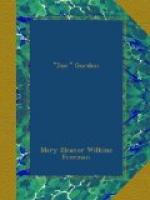drive into the yard, if he should be quick enough.
Suddenly he thought of the dog: that he would
follow him, and of what might happen. The dog’s
chain-leash was on the table. He stole across,
got it, fastened it to the animal’s collar,
and made the end secure to a staple which he had had
fixed in the wall for that purpose. As yet no
intention of injury to the man except in self-defense
was in his mind. If actually attacked, he must
defend himself, of course, but he wished more than
anything to drive the intruder away with no collision.
That was what he hoped for. The time went on,
and the strain upon the doctor’s nerves was nearly
driving him mad. Sometimes the mare balked for
hours. He began to hope that Aaron would leave
her, and return home on foot. That would settle
the matter. But he remembered a strange trait
of obstinacy in Aaron. He remembered how he had
once actually sat all night in the buggy while the
mare balked. The man balked as well as the horse.
“The damned fool,” he muttered to himself
in an agony. The dog growled in response.
Then it was that first the thought came to Gordon
of what might be done to save them all. He stood
aghast with the horror of it. He was essentially
a man of peace himself, unless driven to the wall.
He was a good fighter at bay, but there was in his
heart, along with strength, utter good-will and gentleness
toward all his kind. He only wished to go his
way in peace, and for those whom he loved to go in
peace, but that had been denied him. He began
considering the nature of the man whose dark figure
remained motionless on the driveway. He knew him
from the first. It sounded sensational, his recapitulation
of his knowledge, but it was entirely true. It
was that awful truth, which is past human belief,
which no man dares put into fiction. That man
out there had been from his birth a distinct power
for evil upon the face of the earth. He had menaced
all creation, so far as one personality may menace
it. He was a force of ill, a moral and spiritual
monster, and the more dangerous, because of a subtlety
and resource which had kept him immune from the law.
He outstripped the law, whose blood-hounds had no scent
keen enough for him. He had broken the law, but
always in such a way that there was not, and never
could be, any proof. There had not been even suspicion.
There had been knowledge on Gordon’s part, and
Mrs. Swing’s, but knowledge without proof is
more helpless than suspicion with it. The man
was unassailable, free to go his way, working evil.
Again Gordon thought he heard the nearing trot of
a horse, and again the dog growled. Gordon was
not quite sure that time that a horse had not passed
the house. He told himself in despair that he
could not be sure of knowing when James and Clemency
came, and again the awful thought seized him, and
again he reflected upon the man outside. Suppose,
instead of wearing the semblance of humanity, he had
worn the semblance of a beast, then his course would
have been clear enough. Suppose it were a hungry
wolf watching out there, instead of a man, and this
man was worse than any wolf. He was like the
weir-wolf of the old Scandinavian legend. He
had all the cowardly cruelty of a wolf, he was a means
of evil, but he had the trained brain of a man.




